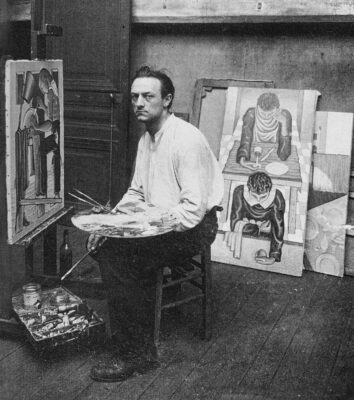
Evaluation Massimo Campigli
Massimo Campigli Valuations - Want to sell a Massimo Campigli piece? Request a complimentary and confidential valuation!Colasanti Casa d'Aste will review your submission and offer a free-of-charge estimate, if your item is suitable for our auctions.
biography
Massimo Campigli, born Max Ihlenfeld on July 4, 1895, in Berlin and died on May 31, 1971, in Saint-Tropez, was an Italian painter of German origin. Raised in Italy from childhood, he moved to Florence with his grandmother and aunt, unaware of his true maternal identity until adolescence. In 1909, he relocated to Milan, where he engaged with the Futurist movement and befriended artists such as Carrà and Boccioni. After acquiring Italian citizenship and adopting the pseudonym Massimo Campigli, he served in World War I, was taken prisoner, and returned to Milan in 1917. In 1919, he worked as a correspondent for "Corriere della Sera" in Paris, where he met Picasso and decided to pursue painting, influenced by Cubism and ancient arts, especially Egyptian, Etruscan, and Mediterranean.
His first solo exhibition was held in Rome in 1923 and in Paris in 1929. Campigli was part of the "Seven Italians of Paris" group and became known for a style combining rigid geometric figures with inspirations from primitive and ancient art. In the 1930s, he created significant frescoes, including those for the Milan Palace of Justice and the Faculty of Letters and Philosophy at the University of Padua. During World War II, he lived between Venice and Milan.
After the war, Campigli settled permanently in Paris, where he established his international reputation with exhibitions in major galleries and museums, including New York's MoMA. He participated in numerous Venice Biennales, receiving a personal room in 1962. His work is characterized by a figurative language evoking ancient civilizations, blending classicism with modernity.
His first solo exhibition was held in Rome in 1923 and in Paris in 1929. Campigli was part of the "Seven Italians of Paris" group and became known for a style combining rigid geometric figures with inspirations from primitive and ancient art. In the 1930s, he created significant frescoes, including those for the Milan Palace of Justice and the Faculty of Letters and Philosophy at the University of Padua. During World War II, he lived between Venice and Milan.
After the war, Campigli settled permanently in Paris, where he established his international reputation with exhibitions in major galleries and museums, including New York's MoMA. He participated in numerous Venice Biennales, receiving a personal room in 1962. His work is characterized by a figurative language evoking ancient civilizations, blending classicism with modernity.






